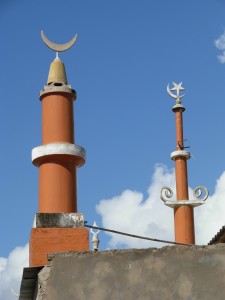We all know the power of words. Words have the power to heal and to destroy. You have probably experienced how words can either help or hurt you.
Since this is my last [...]]]>
We all know the power of words. Words have the power to heal and to destroy. You have probably experienced how words can either help or hurt you.
Since this is my last blog for Countdown to Zero, I want to use my quota of words to reflect upon this journey that began a year and a half ago, when Countdown offered me a regular space to pen down my thoughts and my stories.
I must say the journey has been bittersweet. Delving into the past brought some sad memories.
However, I can also say that blogging taught me to be self-reflective, to take a step back and look around, inside and back. This is an exercise we can easily forget due to all the busyness of life.
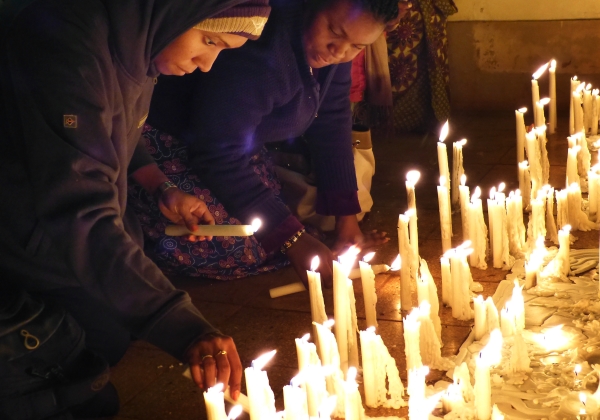
How can you make peace with everything and everyone if you have not made peace with yourself? Zandy Mqwathi reflects on her journey blogging for Countdown to Zero.
Since I don’t believe in coincidences, I choose to believe that there was a good reason why I, amidst the 6.3 million South Africans who are also living with HIV, was afforded such an opportunity.
Am I special?
Not really!
What may be special is that I have consciously opened myself up. I gathered my courage and shared my story with Countdown readers, a story which at times was neither happy nor pretty, but it is my story.
Criticism and doubts
At my church, some fellow believers who read my blogs misread my activism and my willingness to share my story and my HIV status as a lack of faith in the healing power of God.
I found myself constantly grappling with the dilemma, to tell or not to tell, to write certain things or not, because I have also publicly unveiled my love for God and my desire to live according to God’s tenets.
However, blogging evolved into something that I couldn’t have predicted. I realized that I can allow myself to be vulnerable and connect with my emotions and my past.
At times, I questioned my intentions of writing about that specific theme. Would the blog work or wouldn’t it? But things always worked out, from my very first blog on HIV positive teenagers and their challenges when dating.
I found myself glued to my laptop late at nights and over weekends, immersed in my quest to share my thoughts and stories with honesty and hoping to inspire and touch some one’s life in the process.
I hope that every time we need to deal with a difficult situation, we choose to take time to be still, to have a conversation with ourselves and our maker, and find the strength and peace we need.
May 2015 usher in a season of more connections among people and within ourselves.
Thanks, Countdown, for making this journey possible for me.
My poem
To close this blogging chapter in my life, I want to share this poem with you.
Sometimes words dishearten me
Leaving my spirit crushed
By the invincible layers that form me
How do you begin to make peace
with everything and everyone
when you still have not made peace with yourself?
At times life is complex
None of what is familiar still exists to me
Like the final curtain of a theatre stage
I am like a star that almost lost her twinkle
Truth is, Yes! I am fragile, vulnerable
just a girl trapped somewhere in between time
Can I cry now?
For all the times I chose to smile when it was hurting
For all the painful moments
that I managed to numb with distractive addictions
For all the losses
that helped me see the beauty in my life
Standing by the mirror, listening to my inner voice
reflecting back on my life and its catharsis.
Two weeks ago I visited an HIV positive friend in a district not far from Kampala. As usual, I checked services at the hospital where he gets his ARVs. It is run by nuns and offers free treatment for all.
I introduced myself as an HIV/family planning campaigner. The moment I [...]]]>
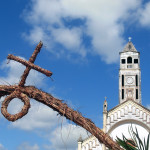
Church and mosque resistance to contraception limits the reproductive health and the choices of people living with HIV.
Two weeks ago I visited an HIV positive friend in a district not far from Kampala. As usual, I checked services at the hospital where he gets his ARVs. It is run by nuns and offers free treatment for all.
I introduced myself as an HIV/family planning campaigner. The moment I mentioned family planning, the doctor warned not to say that to the next person I would see – a nun.
I told the nun I was an HIV/AIDS activist and that was perfect. Yet at one point in the conversation I felt like screaming: “You are pushing our effort doooooown! We can’t live without contraception!!”
I asked my friend to tell me what happens during consultations. He said that patients are not supposed to use, request, or even mention family planning.
So at this hospital, people with HIV are not supposed to engage in relationships, get married, have or space children. We don’t need contraceptives? People living with HIV need condoms, whether their partner is positive or negative, in order not to infect others or get re-infected.
This religious discomfort with contraception reflects an occurrence last month at Uganda’s national family planning conference. Routinely at such events all religions give an opening prayer, but the Muslim imam refused, saying his faith disagreed with the event.
This resistance to contraception is a huge obstacle for those of us living with HIV and in a relationship, to our efforts to build healthy and manageable families.
I know couples with low CD4 counts who are medically advised to wait before having children. This can only happen if family planning services are available to us.
Many of our youth are sexually active. We have no option but to encourage them to use protection from pregnancy.
I find it hard to accept that someone could decide for other individuals how to ensure their personal health. They forget that people deal with their lives differently.
As an activist working hard to halt the spread of sexually transmitted diseases, I feel cheated of choices.
Religious leaders could help a lot but unfortunately they sit in their offices, not knowing the real lives of the people to whom they minister. It’s ugly that some of these leaders only care about their stomachs instead of finding solutions, while those of us who look for solutions are handicapped by their attitudes.
All we get are promises that seldom come to fruition.
We should bring religious leaders together and sit them down for a reality lesson – people living with HIV need contraception!
 Barbara Kemigisa is an HIV/family planning campaigner who lives positively with HIV in Uganda. When she is not campaigning, she dabbles in fashion design, plays guitar, composes and sings R&B songs about living with HIV with the same passion she puts in her work towards zero new infections.
Barbara Kemigisa is an HIV/family planning campaigner who lives positively with HIV in Uganda. When she is not campaigning, she dabbles in fashion design, plays guitar, composes and sings R&B songs about living with HIV with the same passion she puts in her work towards zero new infections.
Speaking with Mitchell Plitnick, Rosen, co-chair of the Rabbinical Council of Jewish Voice for Peace, stressed that the views both in his book and [...]]]>
 Rabbi Brant Rosen leads a congregation in Evanston, Illinois and is author of the new book, Wrestling in the Daylight: A Rabbi’s Path to Palestinian Solidarity.
Rabbi Brant Rosen leads a congregation in Evanston, Illinois and is author of the new book, Wrestling in the Daylight: A Rabbi’s Path to Palestinian Solidarity.Speaking with Mitchell Plitnick, Rosen, co-chair of the Rabbinical Council of Jewish Voice for Peace, stressed that the views both in his book and in this interview are his own and do not represent his congregation. Excerpts follow.
Q: How has your personal view of Israel changed in the past four years?
A: I had seen the conflict as two peoples having two legitimate claims to the land of Israel-Palestine and the only way out of the morass is two states for two peoples. I had identified with Israel as a Jew; that was my narrative growing up. I have deep familial relationships there, visited Israel many times, and even considered moving there.
The shift in my views was a gradual thing, but the breaking point was Operation Cast Lead in 2008-2009 (this was the name Israel gave to its assault on the Gaza Strip at that time). I came to realise this was not a conflict between two equal parties but an essential injustice that began with the birth of the state of Israel and has continued since that time. It is a situation of one very powerful party bending the other to its will.
Once I spoke out about Israel’s outrages in Cast Lead, the dominoes really started to fall for me. As a congregational rabbi I was in a difficult place and people looked to me for guidance. About a year after that, I reassessed my relationship as a Jew to Israel, to the entire issue, not just Gaza, but about Zionism in general.
I become more involved in Palestine Solidarity work, reaching out to Palestinians, some of whom were friends and others who were activists in this area. So many of them reached out to me when I spoke out on Gaza, and I wanted to learn from them what their experience of this issue was.
Today, I know where I stand, very much a rabbi in the Jewish community, still serving my congregation, still motivated by Jewish values, but also someone who stands in solidarity with Palestinians in their struggle for human rights, equal rights and dignity in the land they either live in or seek to return to.
Q: Jewish Voice for Peace is one of the leading groups involved in targeted divestment from Israel’s occupation, a part of the Boycott/Divestment/Sanctions (BDS) movement that seeks to bring public economic and political pressure on Israel. How do you see the future of this movement?
A: I think the movement is growing by leaps and bounds, attracting more and more people. When the U.N. vote on Palestine’s non-member status hit, it drowned out another story I thought was actually more important: Stevie Wonder backed out of a fundraising concert for a U.S. group called the Friends of the Israel Defense Forces.
He is the latest celebrity to express his support for the Palestinian cause by cancelling such concerts following a long list of artists and entertainers who have cancelled shows in Israel. Whether they did it because of public pressure or because they believed it to be right, it shows the power of the boycott movement.
To create political change, leveraging people power is the best method; historically, this has consistently been the case. The fact that Israel reacts so harshly against it shows its potential. When Hillary Clinton says 3,000 new settlement units are “not helpful”, that doesn’t get Israel’s attention.
On the other hand, when Jewish Voice for Peace, Students for Justice in Palestine and a wide range of church groups succeed in getting a large holding company to divest from the occupation, that’s front page news in Israel. That is a sign that this has a great impact, when used in a smart and concerted way.
Contrary to the frequent accusations, BDS is not anti-Semitic. I think the argument that it unfairly singles out Israel from other human rights abusers is disingenuous… The question is not whether Israel is legitimate; it exists and is part of the international community. But if Israel acts in an illegitimate way, citizens around the world have the right and responsibility to leverage what power they can to get them to cease.
Q: Do you think the recent call by 15 mainstream Protestant leaders of many different denominations for an inquiry into whether U.S. aid to Israel is in compliance with existing U.S. law is a significant new development?
A: Yes. I think the most important thing is that the leaders are standing firm and are not backing down despite being excoriated and being called everything up to and including anti-Semites. That is important because up until now the covenant on religious relations has been that you can talk about anything BUT Israel, and this time they’ve broken with that.
They have until now been bullied by the Jewish establishment. This can usher in a new relationship where we can talk about anything, not only the things we have in common, but also these issues, like Israeli policy, where we don’t always agree. I’m proud that JVP stood behind the statement.
Jewish leaders said they would walk out of a planned interfaith summit, and demanded a separate summit to discuss these issues. I thought this was very damaging, this is not something resembling dialogue.
The Church leaders have issued a second statement saying they would be happy to meet with Jewish leaders about this, that we’re happy to talk, but we are not going back on what we said. This is very healthy; this is real dialogue, which occurs when you focus on the painful issues you don’t agree on.
It’s very important that Christians see that many Jews do stand with them when they make statements like this. The Jewish establishment does not represent the Jewish community. The Jewish community is much larger and more complex than these unaccountable representatives whose names most Jews don’t even know.
*Rabbi Brant Rosen blogs at Shalom Rav
]]>The “Arab Spring” has overturned three Arab dictators and offered the possibility of democratic reforms in the Middle East and North Africa at a pace far exceeding what many observers had predicted before the beginning of demonstrations and protests in December 2010. But the rapid transitions in [...]]]>
The “Arab Spring” has overturned three Arab dictators and offered the possibility of democratic reforms in the Middle East and North Africa at a pace far exceeding what many observers had predicted before the beginning of demonstrations and protests in December 2010. But the rapid transitions in the region have given way to frequent mistreatment of religious and ethnic minorities according to the State Departments annual “International Religious Freedom Report.”
Secretary of State Hillary Clinton, speaking at the report’s launch yesterday, said:
- In the Middle East and North Africa, the transitions to democracy have inspired the world, but they have also exposed ethnic and religious minorities to new dangers. People have been killed by their own neighbors because of their ethnicity or their faith. In other places, we’ve seen governments stand by while sectarian violence, inflamed by religious animosities, tears communities apart. Now, the people of the region have taken exciting first steps toward democracy—but if they hope to consolidate their gains, they cannot trade one form of repression for another.
In February, Coptic Christians and Muslims offered a united front in Tahrir square, demanding that Egyptian strongman Hosni Mubarak step down. But the show of unity has been short-lived, according to the report, which highlighted attacks against Copts, Egypt’s Christian minority, and condemned the Egyptian government’s failure to prosecute crimes against Copts or redress laws that discriminate against Christians.
Clinton also noted mistreatment in Iraq, where she said the “hateful, senseless” Monday attack on Shiite pilgrims had “no aim other than to undermine the fabric of a peaceful society,” and Libya, where there have been attacks on sub-Saharan African and Egyptian migrants.
While Middle East and North African countries received special attention due to the recent pro-democracy movements and the steps towards more inclusive governance in Egypt, Libya and Tunisia, the “countries of particular concern” in the State Department’s report are Burma, China, Eritrea, Iran, North Korea, Saudi Arabia, Sudan, and Uzbekistan.
All of the countries “of particular concern” have been sanctioned by the U.S. except Saudi Arabia and Uzbekistan.
]]>A. When it is shown in a pornographic magazine, film or website.
B. Never.
C. When it is emailed to government officials urging action to improve public health.
One could argue about A and B but this blog is [...]]]>
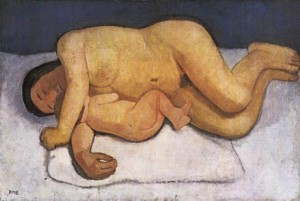
By Paula Modersohn Becker
When is a photo of a woman giving birth considered pornographic? Take your pick:
A. When it is shown in a pornographic magazine, film or website.
B. Never.
C. When it is emailed to government officials urging action to improve public health.
One could argue about A and B but this blog is about C.
Earlier this year, in Zambia, Chansa Kabwela, news editor at the feisty opposition newspaper The Post, was charged with circulating pornography with intent to corrupt public morals. What was her crime? During a nationwide strike by Zambia’s miserably paid doctors, a woman allegedly gave birth without medical assistance in a hospital car park. The baby was in a breech position and later died.
Her family sent Kabwela the photos but she found them too graphic for publication. Instead, she emailed them to the vice-president and other government officials and women’s groups, urging a negotiated end to the strike to avoid more deaths.
President Rupiyah Banda found the photos “morbid and peculiar” and Kabwela, a 29-year-old mother of two, was charged with the porn offence, which carries a five-year jail sentence. The state argued that giving birth is sacred in Zambia and the photos were disrespectful.
If giving birth is so sacred, why was the woman delivering in a car park?
Good sense prevailed and in November a judge acquitted Kabwela.
The Post has long been harassed by government for exposing corruption. This court case is one more instance, using birth, women and tradition as a cover to erode press freedom.
A very famous Christmas birth
This being the season of a famous birth, on the other side of the world, in New Zealand, a mischievous billboard about the immaculate conception has angered Catholics. 
It shows Joseph and Mary in bed. She looks blissful; he looks dejected. The kicker: “Poor Joseph. God is a hard act to follow.”
The twist is that the originator is an Anglican archdeacon who commissioned an ad agency to produce a Christmas poster. The archdeacon argues, somewhat confusedly, that the purpose was to highlight that Christmas is about love, not about Mary’s impregnation by God.
Within hours the billboard was defaced with brown paint. Well, at least this is better than rioting over caricatures of the Prophet or charging an editor with pornography.
Giving birth is charged with cultural meaning: it can be sacred, pornographic, joyful, “eculiar” or offensive. For half a million women, every year, it is deadly.
Yet these deaths do not spark the same outrage as a billboard or photographs.
My wish this Christmas is quite simple: safe delivery for women everywhere, not in a car park and not in a manger, neither holy nor unholy, whether through sex, artificial insemination or immaculate conception. Just safe.
***
Read about why maternal mortality remains so intractable here and about midwives in India.
]]>Yet CEDAW – Convention of the Elimination of All Forms of Discrimination Against Women – has likely impacted on her life and her daughters, if [...]]]>
Yet CEDAW – Convention of the Elimination of All Forms of Discrimination Against Women – has likely impacted on her life and her daughters, if she has any, in many ways, from pension and inheritance rights to the passport they hold.

Quilt made by women of Kyrgztan. (Unifem)
CEDAW, which was adopted by the United Nations General Assembly 30 years ago today, is the global Bill of Rights for Women, the first international human rights treaty devoted to gender equality.
Through its 30 articles, CEDAW has boosted women’s rights worldwide in many ways.
Some examples: new constitutional guarantees for women in Thailand; land- owning rights for women in Kyrgyzstan and Tajikistan; changes to the law of evidence to benefit women in the Solomon Islands; and reproductive health rights in Colombia.
India outlawed sexual harassment in the workplace, Mexico tightened its domestic violence laws and Morocco passed a new family code in 2004. Read more here.
Today CEDAW turns 30 and is the world’s most widely ratified treaty, with 186 signatory countries.
But there is no time to rest on laurels.
Attempts by conservative forces – from Washington to Jerusalem, from Riyadh to Jakarta – to erode CEDAW are underway, primarily in the field of women’s reproductive rights, nationality, family rights and relationships.
Several countries have failed to ratify the treaty – Iran, Nauru, Palau, Somalia, Sudan, Tonga and the United States, although the Obama administration has indicated it will.
Twenty-two countries have signed and ratified but reserve the right not to implement certain provisions.
Some are minor: Australia does not want to send women soldiers into combat.
Others are more threatening: the United Arab Emirates wants to keep its unequal inheritance laws based on Shariah, and Algeria, its Family Law.
Worldwide, the treaty’s implementation is uneven. In the Occupied Palestinian Territories, Palestinian women suffer abuse and denial of basic human rights at the hands of Israeli settlers and soldiers. The right to family reunification is particularly ignored.
Nevertheless, in three decades, CEDAW has truly changed the world for women, for those who fly on planes and for those who ride donkey carts alike. Equality is our right.
HAPPY ANNIVERSARY!
I will call her Gabra (gift, in Amharic), for our conversation was private. I met her at a monastery near Lalibela, the mystical city of [...]]]>
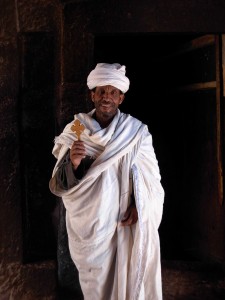
Patriarchal in all senses. By M. Sayagues
What drives a 17-year-old girl to enter a monastery? Today she is 30, and still happy about her choice. Her eyes sparkle and her laughter comes easy. She exudes peace.
I will call her Gabra (gift, in Amharic), for our conversation was private. I met her at a monastery near Lalibela, the mystical city of rock-hewn churches in northern Ethiopia.
Monastic life has a long tradition and prestige in the Ethiopian Orthodox Church. The oldest monastery dates from the 6th century. A monastic renaissance between the 13th and 16th century brought great moral and political authority to clergy.

Custodians of tradition
Gabra’s rock-hewn monastery dates from the 12th century. Her room is excavated in the pink tufa rock. Two built-in-the-rock platforms, covered with a thin mattress, do as couch and bed. An old cupboard holds a few plates and cooking utensils, three of the long green robes worn by Ethiopian peasants, the white headscarves that nuns wear, and two pairs of sandals.
For income, she and her fellow nuns weave cotton and silk into diaphanous shawls, sold at the monastery. She rises before dawn to pray – the first of daily seven prayers. Her ambition is to study theology in Addis Ababa or in Lalibela.
Gabra is not completely cut off from the world. She has a cellphone and a radio. On Sundays, relatives and friends visit.
Choices
I ask her if marriage and children ever interested her.
“It is a privilege to be single and not to have children,” she says softly, smiling but firmly. She sounds relieved.
Unmarried myself, I agree that motherhood and marriage are just one option. I understand the spiritual call, the peace of contemplation and withdrawal, of a simple lifestyle unencumbered by material things.
Yet I wonder if female genital mutilation had to do with her decision.
In Ethiopia’s eastern region, a girl might suffer genital cutting between the age of 15-17, before marriage. Her clitoris would be cut, sometimes the labia.
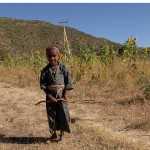
She has a right to her bodily integrity.
In Somali region, she would have infibulation at a younger age: the complete removal of her genitalia and, to preserve virginity, being stitched shut with an acacia thorn, leaving only a hole to urinate.
About three-quarters of women in Ethiopia between 15-49 have suffered some form of genital mutilation, said a government survey of 2005. The practice is fading – but too slowly, say activists.
It is not called mutilation for nothing. Sex and childbirth will be extremely painful and dangerous.
If finding a husband means suffering genital cutting, a hard mattress in a rock-hewn room is a much better place than a king-size wedding bed.
Gabra did not speak English, my male guide spoke little, and sex topics are taboo in Ethiopia, so the conversation went in another direction. Gabra was curious about my life, my work, and my daughter. 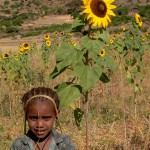
“Would you want to live like me?” she asked. “I don’t think I could,” I said. “But I feel the beauty of this simplicity.” She smiled.
Ethiopia looks and feels ancient and spiritual. Social cohesion is remarkable. But the same lifestyle that makes ferenji (foreigner, in Amharic) wax lyrical about the “biblical landscape and people” binds women to painful and dangerous traditions.
Some traditions are simply annoying. Women cannot join the rites if they are menstruating, ergo unclean. At no time of the month can women, local or foreign, enter the most sacred chapel of the Lalibela complex, Bete Mikael, where King Lalibela is buried. We are only allowed a glimpse from the door. In some monasteries, no females, including of the animal kingdom, are allowed.
Monastery visitors take leave at 5 PM (international time; in Ethiopian time, 11 in the night). I make my way down the stony path, the tufa rock glowing pink and gold in the sunset.
I am thinking that the monastery – the spiritual world – may be a blessed refuge from the hardship of being born female in a deeply patriarchal world.
Read recent IPS stories about genital cutting in Uganda, Sierra Leone and cross-border in West Africa.
]]>
